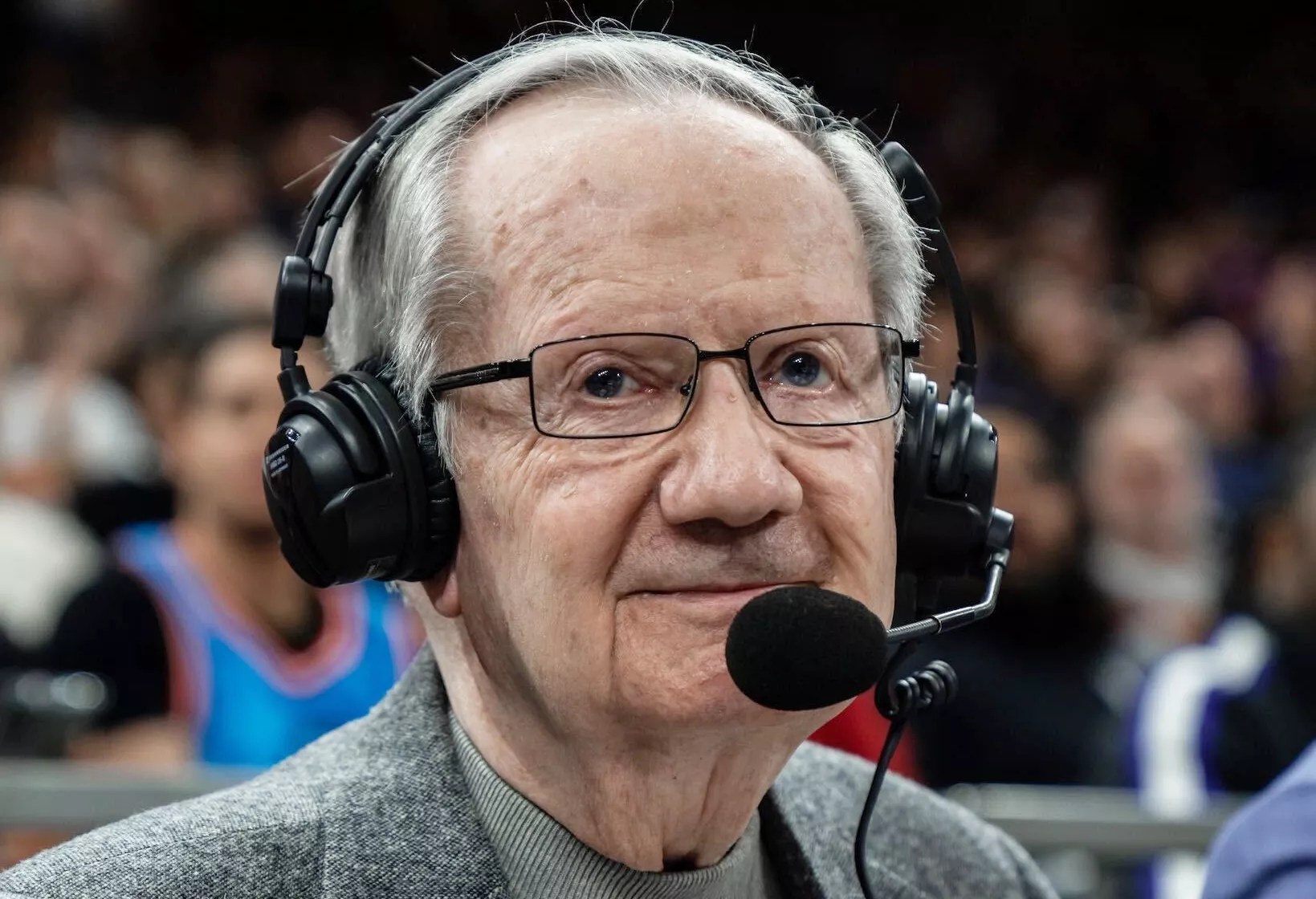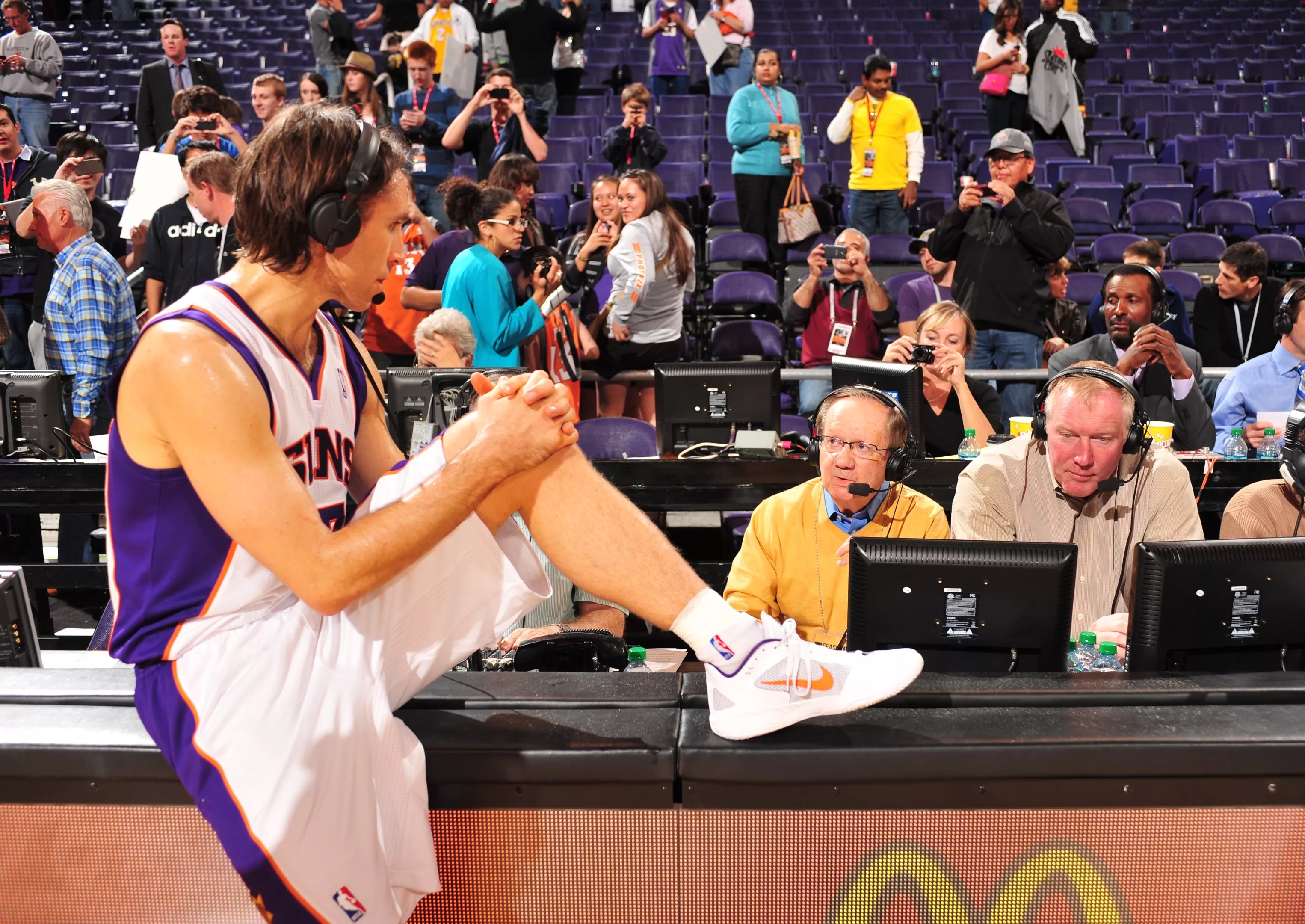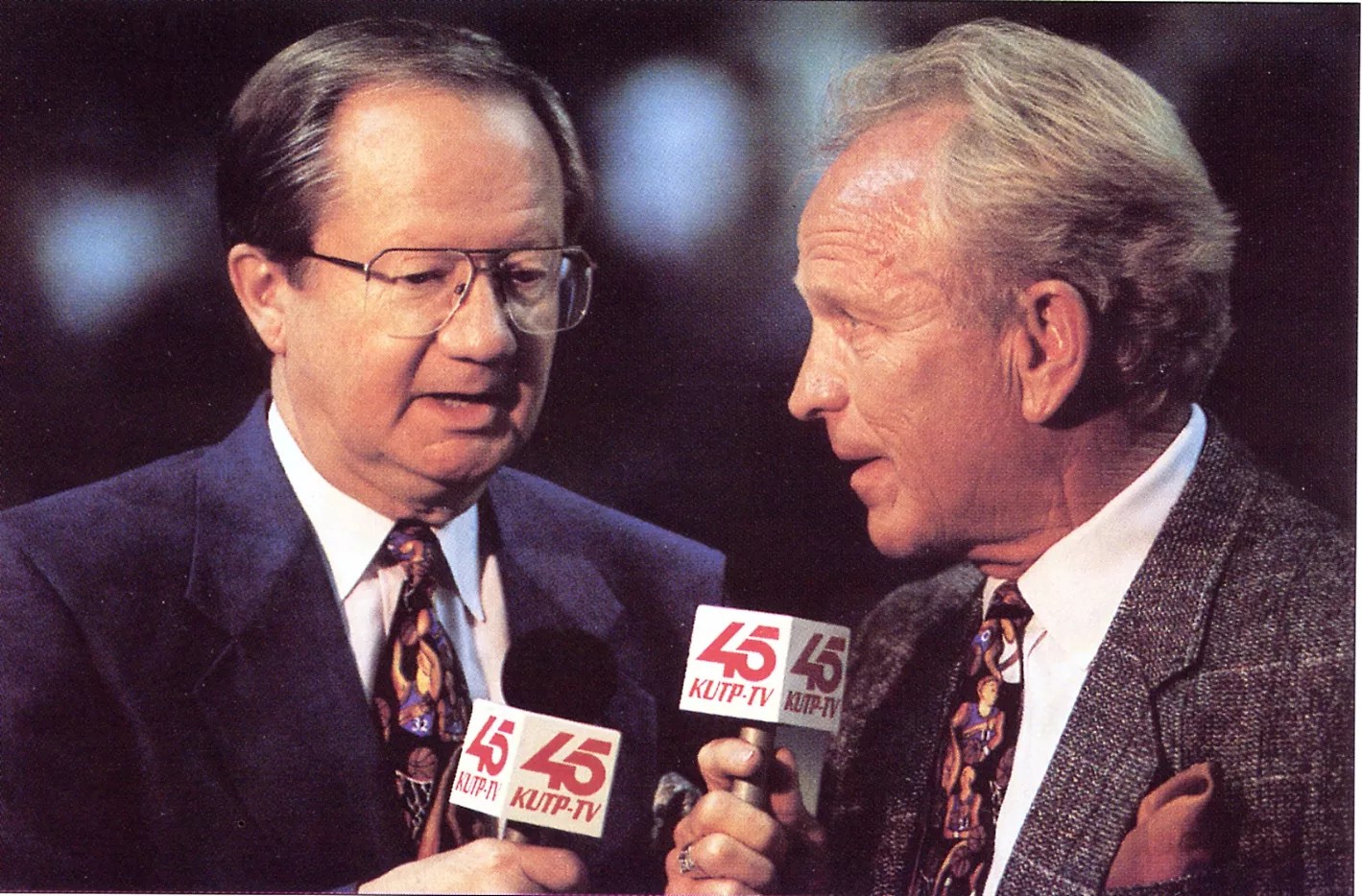
Phoenix Suns

Audio By Carbonatix
When Phoenix Suns play-by-play announcer Al McCoy hangs up his microphone after the team wraps up its season, it will mark the end of an era.
The veteran sportscaster, who turns 90 later this month, has been calling Suns games on television and radio for 51 years, describing the action in his distinctive, folksy style.
For the past five decades, McCoy has become a Valley institution whose tenure with the Suns has lasted almost as long as the team’s itself. His iconic catchphrases (like “Shazam!” when the Suns make a three-pointer or “Heartbreak Hotel” after a missed shot) are the stuff of legend, as are the amusing nicknames given to players (such as calling Suns legend Steve Nash’s becoming the “Nash Rambler.”)
McCoy has witnessed the Suns’ ups and downs over the years, from the depths of the team’s drug scandal of the mid-’80s to Phoenix’s three separate appearances in the NBA Finals.
An old-school remnant of a different era of the NBA, McCoy’s influenced many current sportscasters. (To wit: NBA on ABC play-by-play announcer Mike Breen cited him as a personal hero in 2021.)
Not bad for a former Iowa farm boy who grew up listening to the legendary Harry Caray on a battery-operated radio.
This weekend, McCoy called Phoenix’s final games of the regular season. He was honored at halftime when the Suns battled the Los Angeles Clippers on April 9 at Footprint Center. McCoy will continue to call the Suns’ games during this year’s playoffs, which might see the team finally win an NBA championship after decades of frustration.
Does he think the Suns can win it all this year? It’s one of the many questions Phoenix New Times asked McCoy during a recent interview.

Al McCoy (left) interviews former NBA Commissioner David Stern.
Phoenix Suns
How does it feel looking back on 51 years of being the voice of the Phoenix Suns?
Well, obviously as you look now, it’s gone by in a hurry. So many things happened during those 51 years, but it just seems like everything has gone by quickly, very quickly.
For longtime Valley residents, you’ve been as much a part of the Suns as the Gorilla. How does that feel?
Well, I came along at a time when announcers were associated with their team. I don’t think that situation is ever going to develop again. Things have changed in the broadcasting industry. But when I was growing up as a youngster, and I grew up in the Midwest on a farm in Iowa, the teams, mostly baseball, all had their own announcers. And I always thought that would be something that I really would have as a key in my career. And eventually, that’s the way that it turned out. It’s been great for 51 years to be recognized as the voice of the Suns. As I said, I think those days in the broadcasting business are kind of over.
People have compared you to the equivalent of what Harry Caray was to the Chicago Cubs or Vin Scully was with the Los Angeles Dodgers. How does that feel?
Well, that’s a good analogy. I appreciate that. But that’s basically what I was talking about. That used to be pretty commonplace. But now, with so many different facets of broadcasting, the internet, and cable [television[, there’s more than just the one announcer that’s associated as part of the team. And I would say probably we won’t continue to see that, and I’m very pleased that I was a part of that era.
Growing up, did you idolize any sports announcers yourself?
I grew up on a farm [in Iowa]. We had a battery radio. And yes, I listened to Harry Caray in St. Louis. I listened to Jack Brickhouse in Chicago, [sportscaster] Bill Stern, and Don Dunphy’s boxing announcing. So I had a lot of announcers that I followed with reverence when I was growing up.
What are your memories of originally coming to Phoenix in the late 1950s?
I came here initially to do minor league baseball. The Giants had moved to San Francisco from New York and moved their Triple-A baseball team from Minneapolis to Phoenix. So I came to [call] games for the Phoenix Giants at that time. And, of course, it has obviously changed a lot in the years that I have been here. When I drive around now, it’s unbelievable. The expansion of the city and the state has just been fantastic and it’s been great to be a part of it. We now have teams for all four of the major sports. And I think Phoenix can be acknowledged as one of the great sports cities in the entire country, but to see what has happened here has been amazing.
When you first started calling Suns games in the early ’70s, no one took the team seriously in those days, right?
Well, that’s true. But then when the Suns did make the playoffs in ’72 and wound up in the Finals against Boston and played the first triple overtime ever in the history of the Finals of the NBA, the town, the city, and the state really responded. They were all sellout games in the playoffs that year. And I think that really turned Phoenix into a Sun’s city, so to speak. And that was particularly early. Obviously, since then, there have been ups and downs.
But I think that early playoff series against the Boston Celtics, because the Suns were not expected to be there at all, they just barely made the playoffs, and they were just over 500 record-wise on the year. But the fact that they did so well, they kind of became America’s team in that triple-overtime game against Boston. And those were all sellout games at the Coliseum. I remember people standing in line trying to get tickets to those games. And I think that really started the love affair with the Suns. And I’ve always felt since then, even though as I mentioned, we have all of the major professional teams, football, baseball, hockey, it’s still a Suns town. Now, when the Suns are good, the fans come out of the woodwork, so to speak.
Was the Suns’ playoff run in 1976 incredible to experience?
That’s right. And they beat the Golden State Warriors to get to the Finals against Boston, and that deciding game was in San Francisco. And when we came back from there, they had to close the airport here in Phoenix. There were so many fans out there waiting to greet the team that they actually had to shut down the airport. So that really, I think was the start of the love affair between the fans and the Suns.
The Suns’ triple-overtime loss to the Boston Celtics in the 1976 Finals is still considered one of the greatest NBA games ever played. Would you agree?
It was, and I think that’s strictly [because] it was such an emotional game. There was no air conditioning in the [original Boston Garden]. It was a hot, humid day in Boston. And to me, it’ll always be considered the greatest, particularly from the sheer emotion of the night and of the game. Yeah, it was something else, that’s for sure.
Was it hard to call Suns games during their down periods over the years?
Obviously, my philosophy as a broadcaster is to call the game as factually as possible, give the opposition as much credit as they deserve. And obviously, [fans] going to be happier if the Suns are winning, but you can’t disguise the play. If the Suns are playing poorly, if a guy is shooting the ball poorly, you certainly have to report it. And that’s always been my philosophy. But in those years when the team was down, I think the fact that I really love the game, I think the NBA game is the greatest sport of all. What sport can you say there’s a great play every 24 seconds? And there is in the NBA. So even though the Suns had losing years, I still got to see the great teams, the great players in the NBA describe their activity. And to me, that was very important.

Al McCoy (center-right) speaks with then-Phoenix Suns star Steve Nash.
Phoenix Suns
Over the years, you’ve come up with a lot of nicknames for Suns players, like Steve Nash was the “Nash Rambler” or Shawn Marion was “The Matrix.” Where do those come from?
[They just] seem to kind of pop up. Sometimes they come from a player because a teammate calls them that, or sometimes they just pop up out of the spur of the moment. I have to tell you the Steve Nash story. He was drafted by the Suns [in 1996], and at the press conference introducing him to the media, one of the writers said to me, “Well, do you have a nickname for Steve Nash?” I said, “That’s a natural, he’s the ‘Nash Rambler.'” A day or two later, I ran into Steve and he said, “Hey, Al, where did you get that Nash Rambler?” He didn’t even know that there had been an automobile in those days that was called the Nash Rambler. He laughed and got a kick out of it.
Of all your catchphrases, which one is your favorite?
Probably Shazam, because when that started, the three-point shot, when it came into the NBA, I looked at it as kind of like a home run in baseball. And most baseball announcers have a home run call, “Might be, it could be, it is,” or, “Going, going gone,” or whatever. So I looked initially that the three-point shot would be similar to a home run call.
And so I started thinking about what I might want to use. And when I was growing up as a kid, I used to have a favorite comic book that I read, and it was Captain Marvel. He was like a Superman character, but he was a little radio reporter named Billy Batson, and when he became Captain Marvel, he said, “Shazam.” And Lightning and Thunder and all this excitement went off, and that word came from Socrates, Atlas, Zeus, Achilles, and Mercury. And so I thought, “Well, I think that might be it.” And the first year of the three-point shot, I think the Suns took two, and I didn’t think that there would be a bunch. And now, there are one every two sections, but that’s where Shazam came from and probably has become the best known.
And to many Suns fans, a game isn’t truly over until you say, “You can put it in the deep freeze.”
Well, that’s right. Put this one on the old deep freeze. Right.
Is the era of announcers coming up with catchphrases over as well?
Right now in the NBA, I do think that they still have some personal phrases that they use, but it’s not like it was 50 years ago.

Al McCoy (left) with the late Cotton Fitzsimmons in the ’90s.
Phoenix Suns
At any point when the Suns have made the NBA Finals, has the thought, “This is going to be the year” ever popped into your mind?
I thought the team that played [the Chicago Bulls in 1993] had the talent to win it all. The initial team was a surprise. And of course, going against Milwaukee [in 2021], I thought the Suns had the ability to win it all, but that didn’t happen either.
Can the Suns win it all this year?
Well, that’s always a possibility. Will they win it all? Well, we’ll just have to wait and see.
That would be a great sendoff for you, right?
Well, that would definitely be the icing on the cake. I don’t think there’s any question about that. A championship would mean so much to everyone [in Phoenix]
Why did you decide to hang up your microphone after 51 years?
Well, I think it’s time for someone else to have as much fun as I’ve had for 51, and I’m not a teenager anymore, and I stopped traveling a couple of years ago, just doing the home games. I just thought it was time.
What will you miss most of all about calling games for the Suns?
What I’ll miss most of all is the relationship with the players. But you really don’t have that in any sport anymore. The players in all sports are isolated so much that you really don’t have the relationships that we had years ago. And of course, a lot of the differences have been, for example, years ago we just traveled commercial and we did not leave after games. So after games, you might be going out to get a burger and a beer and you’d be with players. So the relationship with players and coaches is probably what I miss more than anything. I love the game. I love the game of basketball. I think that’s important, and I think everybody knows that. But the relationship with players particularly is what I’ll miss.